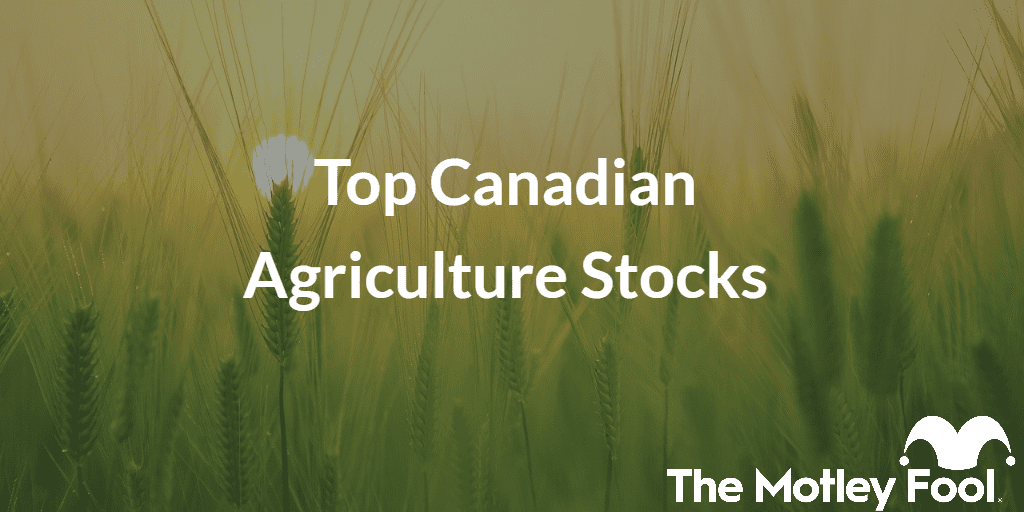Agriculture companies are some of the most essential to Canadians’ day-to-day lives. Let’s break down what you need to know about investing in agricultural stocks in Canada.
What are agriculture stocks?
Agricultural stocks are companies involved in the production and sale of foodstuff commodities, such as wheat, livestock, sugar, soybeans, corn, etc. Also included are companies that produce fertilizer, packaged foods, and agricultural machinery and equipment used in industrial farming.
Agricultural stocks generally fall under the umbrella of the consumer staples sector, which also encompasses the stocks of companies that derive their products and services from the agricultural industry. They include bulk retailers and grocery stores that depend on agricultural companies for produce. Ag stocks may also be classified as basic materials or industrials, depending on the company.
Agricultural stocks tend to be defensive, given the essential nature of their products or services. As a result, they tend to have lower volatility than the overall market. Many of these companies are mature, large-cap, blue chip stocks that pay decent dividends and have strong balance sheets.
The agricultural industry often experiences strong tailwinds during inflation due to rising commodity prices. As food prices soar, agricultural companies can enjoy higher revenues, better margins, and improved earnings, which can translate to a higher valuation and share price.
RELATED: Top Agriculture ETFs in Canada
Investing in Canadian agriculture stocks
Canadians looking to buy domestic agricultural stocks should begin their search in the consumer staples sector of the Toronto Stock Exchange. From there, it is important to determine if the company under consideration is involved primarily produces foodstuffs or instead deals with equipment /services.
The former derives most of its revenues from growing crops and livestock, whereas the latter is primarily concerned with manufacturing and selling equipment or providing support services. This is important to note as various macroeconomic factors might affect different types of agricultural companies differently.
When considering Canadian agricultural stocks, many of the same considerations for fundamental analysis and valuation that apply to the consumer staples sector should be considered:
- Is the company’s balance sheet healthy? What is the current and long-term debt-to-equity ratio? Is there negative shareholder equity?
- Has the company consistently grown quarterly revenues and earnings year over year? If so, at what rate?
- Are the company’s gross and operating margins positive and ample?
- How does the company’s enterprise value-to-EBIDTA ratio compare with peers in its sector?
- What are the company’s price-to-book, price-to-sales, price-to-free-cash-flow, and price-to-earnings ratios, and how do these compare to peers in its sector?
- What does the company’s return on assets, return on equity, and return on invested capital ratios look like?
- Does the company have a decent cash runway and sufficient cash flow for long-term operations?
Top Canadian agriculture stocks
Here’s a look at some of the top agricultural stocks on the Toronto Stock Exchange:
| Agriculture Company | Description |
|
Nutrien (TSX:NTR) |
Nutrien provides crop inputs and services to growers and farm centres worldwide. |
|
Saputo (TSX:SAP) |
Saputo produces, markets, and distributes dairy products under various brands across Canada and worldwide. |
|
SunOpta (TSX:SOY) |
SunOpta manufactures and sells plant-based and fruit-based food and beverage products worldwide. |
Nutrien
Nutrien provides a variety of agricultural inputs and support services, including nutrients like potash, nitrogen, phosphate, and sulphate; crop protection products like pesticide and seeds; and financial capital. The company primarily operates through a network of 2,000 retail locations throughout Canada, the United States, South America, and Australia.
Recent sanctions against Russian potash producers provided Nutrien with strong headwinds. The company is one of the largest potash producers in the world and has experienced strong success distributing its products via e-commerce. Nutrien intends to increase its potash production to 18 million tonnes by 2025 to meet demand.
Saputo
Saputo is Canada’s largest dairy producer and distributor, offering a variety of cheese, milk, ice cream, yogurt, butter, cream, whey supplements, and powdered goods under a variety of brands. The company distributes its products worldwide wholesale, focusing on clients in Canada, the United States, Argentina, Australia, and the United Kingdom.
In late 2022, the Canadian Dairy Commission approved the Dairy Farmers of Canada’s request for a milk price hike. Saputo will likely attempt to recover costs by passing those along to customers via higher prices. This may have a positive effect on the company’s top-line revenue and earnings in the following months.
SunOpta
SunOpta manufactures and sells prepackaged foods through two segments: plant-based foods and beverages, and fruit-based foods and beverages. The former deals with products that utilize almond, soy, coconut, oat, and hemp; while the latter offers individual and bulk frozen fruits such as strawberries, blueberries, mangos, pineapples, and blends.
As global retail sales of plant-based food alternatives are expected to grow in light of environmental considerations, SunOpta may experience stronger tailwinds. The company may also see benefits from soaring prices for dairy and meat, which may drive consumers to seek cheaper plant-based alternatives, especially when it comes to protein substitutes.
Are Canadian agriculture stocks right for you?
Investing in Canadian agriculture stocks is generally regarded as being lower on the risk-reward spectrum compared to flashier higher-growth sectors like technology or communications. Agricultural stocks also tend to have lower volatility and slower revenue/earnings growth, making them a potentially good core investment for defensive investors.
